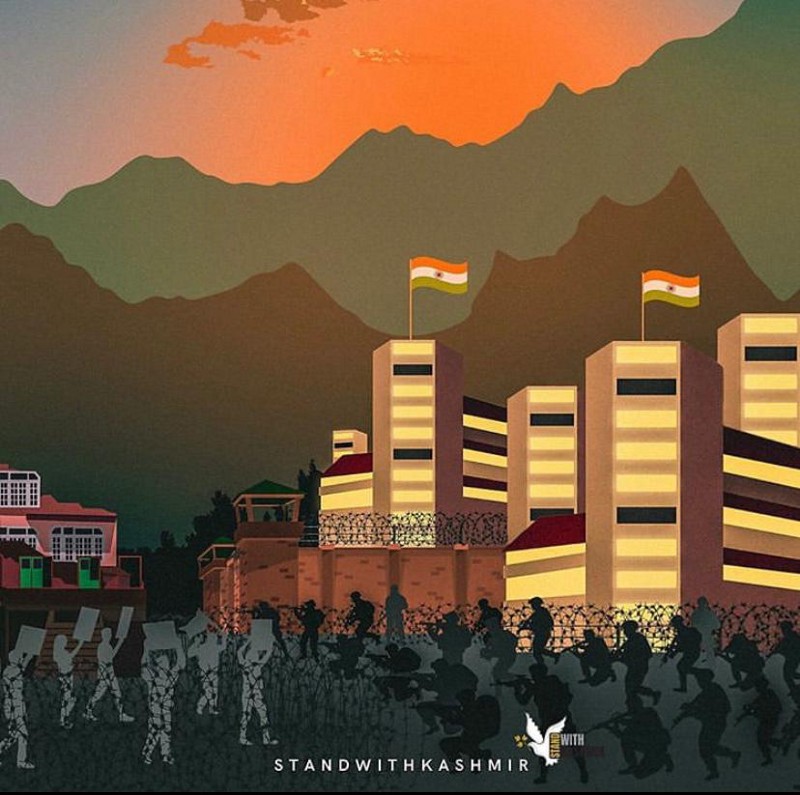India’s 10 steps to settler colonialism in Kashmir.
Srinagar, Indian-occupied Kashmir. July 3, 2020.

Settler colonialism is both a historical and contemporary phenomenon. Conventionally associated with the genocidal origins of the white settler colonial states of the US, Canada, New Zealand, and Australia, the settler colonial project of dispossession and demographic change is also evidenced by the apartheid state of South Africa, the Zionist settler apartheid of Palestine, and now more “officially”, the Indian settler-colonial project of Kashmir.
Kashmir has been colonized by the Indian state since 1947, but recent changes demonstrate how it is increasingly becoming a settler-colonial project. As opposed to classic colonialism that aims to unlawfully retain control of a territory, take advantage of its resources, and deny its people self-determination, settler-colonialism seeks to acquire land so that colonists can settle permanently and form new communities in what they see as their new “home.” In Kashmir, we have seen a combination of classic as well as settler-colonial strategies.
Video of the Indian Consul General calling for settlements in Kashmir: “If Israeli People can do it, we can also do it”.
Drawing from different contexts, below are some key aspects of how settler-colonialism has arrived in Kashmir.
1. LAND SEIZURE, SETTLEMENT & APARTHEID
Occupation of Indigenous people’s lands is central to settler-colonial state processes, as the settler state and settlers desire expansion. In the context of Turtle Island (North America in colonial terminologies), we see that for the past 500 years white settler states keep taking over lands. In Kashmir too, over the decades the Indian state and military have taken control of more and more land, underscoring how an existing settler-colonial project is expanding. With the reading down of Articles 370 and 35A of the Indian Constitution, which had restricted land ownership to Kashmiri state subjects, Indian settlers will have more capital to take over Kashmiri lands.
As with Israeli settlements in Palestine, India may soon start establishing Indians-only settlements in Kashmir. The ruling BJP party has already called for segregated Hindu enclaves in Kashmir. These settlements will come with their own militarized infrastructure, including additional troops, walls, checkpoints, military watchtowers, and their own economy and systems of governance — a system of legalized discrimination or segregation known as apartheid. In addition to settlements, top Indian army officials have also called for “deradicalization camps” for Kashmiri youth, akin to internment camps for the Uighurs in China.
2. KILLING, GENOCIDE & DEHUMANIZATION OF INDIGENOUS PEOPLES
One of the defining features of settler-colonialism is the killing, maiming, and elimination of Indigenous peoples by occupiers in order to take over their territory. The countless murders of Kashmiris, extrajudicial killings, use of Kashmiris as human shields, and use of pellet guns, reveal clearly how Kashmiri lives and dignity don’t matter to the Indian military or to Indian citizens as Kashmiris are always already disposable in their eyes.
This disposability renders Kashmiri Muslims as rightless and also works to dehumanize them (this dehumanization is clearly visible in portrayal of Kashmiris in Indian popular culture). For settler colonialism to thrive, Indigenous people’s elimination is required for land grabs. Throughout their history, starting from the Jammu massacre in 1947, Kashmiri Muslims have undergone a series of massacres and killings. This incremental genocide has only intensified since August 2019, which has led Genocide Watch to issue a genocide alert for Kashmir.
3. CAPITALISM & RESOURCE EXTRACTION AS “DEVELOPMENT”
Along with land grab, capitalist accumulation and resource extraction are the other key economic logics of settler-colonial state formations. Capitalist interests of the state align and often dictate the colonial pursuits. India has always eyed Kashmir’s water resources and its capabilities to generate electricity for rest of India, while intentionally depriving Kashmir of the electricity it produces.
Within days after the abrogation of Article 370, Indian corporations like Reliance Industries began making plans to invest heavily into Kashmir. Profits of these investments, we already know, will go to these corporations in India. Rights to important industries, such as mining, are also being given to Indian companies. Indian capitalists also seek to dominate the travel, tourism, and hotel industries. As more and more economic and employment opportunities are opened up to Indians, Kashmiris will be deprived of what little job security they had.
4 . DEMOGRAPHIC CHANGE
Colonizers also change the demographics of occupied lands by bringing more settlers as well as other migrants. For instance, in the case of the US occupation of Hawai’i, we have seen drastic changes in the demography with the white American and European settlers as well as Asian migrant communities. With the recent changes to extend “domicile” to Indians, the settler state is systematically attempting to bring a drastic demographic threat to Kashmiris. With this change, the Indian population in Kashmir will significantly increase which will make the right for self-determination even harder for Kashmiris.
5. MILITARY AND LEGAL OCCUPATION
A colonizing power uses its tools of military and legal structures to further its occupation agendas. With over 700,000 Indian forces, Kashmir is already the most militarized region in the world, and has seen a further increase in military presence in the last year. Further, by giving the military extra-legal powers, like the Armed Forces Special Powers Act, the state has given them immunity against all the war crimes and human rights abuses they commit on Kashmiris. India uses the law to further repress Kashmiris and take away their basic rights, like the freedom of expression, movement, association, access to internet and media. Laws like the Public Safety Act and the Unlawful Activities (Prevention) Act are meant to further criminalize any and all forms of dissent — for example, a Facebook status against India can land you in jail.
6. REWRITING HISTORY & KNOWLEDGE PRODUCTION
For the colonizer to create legitimacy for its rule, it seeks to re-make or appropriate the history of the Indigenous community to fit its own ideological project. It creates its own false historical accounts to discount how the occupation began and undermines Indigenous histories of resistance. It also does so by changing textbooks, the names of buildings and important landmarks, through the imposition of Hindi, and by creating a new historical narrative that the Indigenous community must learn to dis/identify with. In Kashmir, the Indian government seeks to posit Kashmir as integral to the idea of a Hindu homeland and seeks to erase its illegal occupation of Kashmir. Such false narratives are readily adapted by Indians to claim Kashmir as their own. International media and organizations also rely on Indian nationalist retelling of these histories and often erase Kashmiri histories and voices from the global realm.
7. COLONIZER’S RELIGIOUS NATIONALISM
Much like how Christianity and “Manifest Destiny” were used by European settlers to colonize Indigenous territories in North America, and how Zionism is mobilized to continue the occupation of Palestine, Hindutva discourse about “Hindu rashtra” is deployed to justify the Indian settler-colonial project in Kashmir. Settlers seek to dehumanize the colonized and discriminate against their religious identities to claim ownership of Indigenous lands. Settlers also portray their occupation as destined by their own religions. Despite Kashmir’s multi-ethnic, multi-religious past, Kashmiri Muslims are painted as “foreigners” or “invaders” to the region, while Kashmiri Hindus are depicted as the original “aborigines” claiming ownership over the land — even though both are equally indigenous. In this context, the intensive promotion of pilgrimages like the Amarnath Yatra reinforces the idea of Kashmir being ‘integral’ to India’s sacred territoriality.
8. ENABLING “COMMUNALISM”
Colonizers seek to categorize and divide identities in order to claim legitimacy for their occupation. India has benefitted from creating divisions across religious, sectarian, and ethnic faultlines with Kashmir (Muslim vs. Hindu/Sikh/Buddhist, Shia vs. Sunni, etc.). These divisions have ruptured the otherwise multireligious and multiethnic fabric of Kashmiri society. Furthermore, the Indian state continues to play an active role in creating tensions between various groups in Kashmir by enabling violence against religious minorities and blaming it on Kashmiri Muslims, subsequently painting the freedom struggle as “communal.”
9. “SAVING” KASHMIRI WOMEN AND QUEERS FROM KASHMIRI MEN
Rendering the colonized as exceptionally patriarchal is a tried and tested colonial strategy in many different historical and geographical contexts. 19th and early 20th century British colonial administrators pointed to practices such as sati (widow immolation) in India and the veil in Egypt as evidence of the backwardness of these societies, as opposed to British society — even though women’s rights such as suffrage found passionate opposition from men in Britain. In a similar fashion, India has used the argument of equal rights for Kashmiri women to remove Article 370, claiming that Kashmiri women were not given equal rights for owning land and property, despite them having had full rights to land ownership since 2002.
In more recent settler contexts, colonizers now also project themselves as queer-friendly and project the colonized as always homophobic. For example, Israel frequenty bills itself as “the only queer-friendly place in the Middle East” — a pinkwashing strategy that legitimizes it as a modern nation and renders Palestinians as homophobic. Although India has barely just decriminalized homosexuality and has a very long way to go towards full equality for queer Indians, many Indians cheer the removal of Article 370 on behalf of Kashmiri queer people falsely arguing that the scrapping of Article 377 (criminalizing homosexuality) did not extend to Kashmir until Article 370 was removed.
10. CLIMATE & ENVIRONMENTAL CRISES
Settler colonial-capitalist regimes also subject Indigenous lands and peoples to climate crises, environmental crises and disasters. Along with exploitation of water resources for electricity production, the Indian state has allocated huge land properties for army use, industrial development projects, and now, for the anticipated domiciles. This appropriation of land and resources has and will further result in massive deforestation across Kashmir, exacerbating environmental degradation and further intensifying the climate crisis in the region.
Stand With Kashmir (SWK) is a Kashmiri diaspora-driven independent, transnational, grassroots movement committed to standing in solidarity with the people of Indian occupied Kashmir in ending the Indian occupation of their homeland and supporting the right to self-determination of the pre-partition state of Jammu and Kashmir. We want to hear from you. If you have general inquiries, suggestions, or concerns, please email us at info@standwithkashmir.org.
©2025 StandWithKashmir All rights reserved. SWK is a 501(c)(3) non-for-profit organization.


Leave a Reply